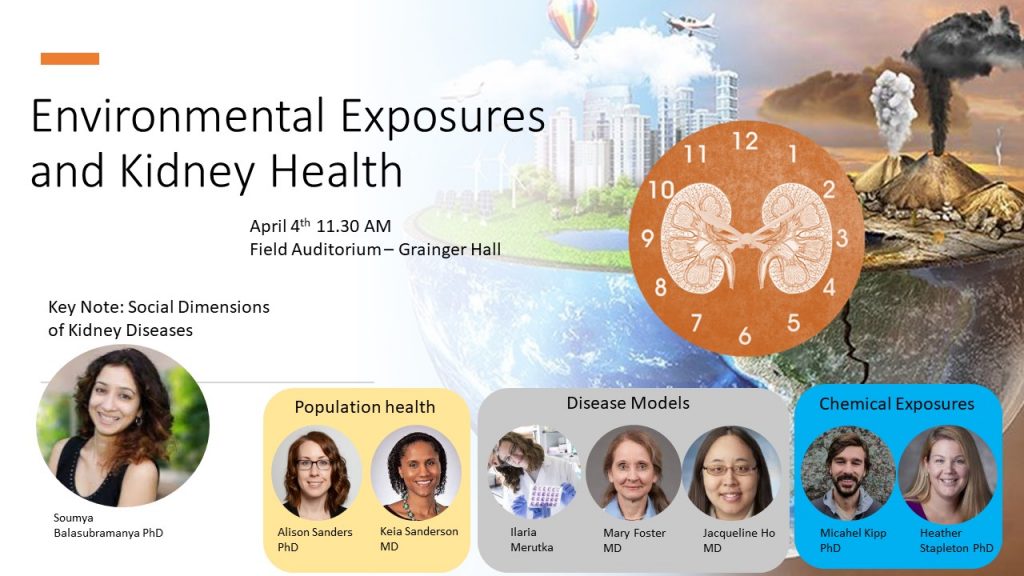Environmental Exposures and Kidney Health
Thursday, April 4, 2024
Duke Nicholas School of the Environment, Durham, NC
Location: Grainger Hall (9 Circuit Drive), Field Auditorium (room 1112)

In this symposium, speakers across multiple disciplines will discuss population health studies, animal models, and chemical exposures as they relate to kidney diseases.
This event is *FREE* to attend and open to all. Registration is required (see registration link below). We have options for both in-person and virtual attendance.
Agenda (all times are Eastern)
| 11:00am – 11:35am | Registration Sign in |
| 11:35am – 11:45am | Welcome and Opening Remarks |
| 11:45am – 12:30pm | Keynote Address: Water and Chronic Kidney Disease in Sri Lanka: Behaviors and Policy Responses Soumya Balasubramanya, PhD; Senior Economist, World Bank |
| 12:30pm – 1:30pm | Lunch + Networking (food & drink provided for registrants) |
| 1:30pm – 2:00pm | Metal Mixtures and Developmental Kidney Function Alison Sanders, PhD; Assistant Professor, School of Public Health, University of Pittsburgh |
| 2:05pm – 2:35pm | In Utero Exposure to Maternal Diabetes Impacts Kidney Development and Function Jacqueline Ho, MD, MSc; Division Chief of Pediatrics, Nephrology; Associate Professor of Pediatrics; Director, Pediatric Nephrology Fellowship, UPMC Children’s Hospital of Pittsburgh; Co-Director, Pediatric Scientist Development Program |
| 2:40pm – 3:10pm | Inhalational Exposures and Pulmonary-Renal Crosstalk in Renal Injury Mary Foster, MD; Professor of Medicine; Member of Duke Cancer Institute; Duke University School of Medicine |
| 3:15pm – 3:45pm | Working Across Lab Models and Molecular Epidemiology to Understand Developmental and Chronic Renal Toxicity from Agricultural Drinking Water Contaminants Ilaria Merutka, PhD Candidate; Environment, Duke University |
| 3:45pm – 3:55pm | Break |
| 4:00pm – 4:30pm | Natural Stable Isotope Variability: A New Tool for Studying Kidney Health? Michael Kipp, PhD; Assistant Professor, Division of Earth and Climate Science, Duke University |
| 4:35pm – 5:05pm | Using Silicone Wristbands to Characterize the Personal Chemical Exposome Heather Stapleton, PhD; Ronie-Richele Garcia-Johnson Distinguished Professor, Nicholas School of the Environment, Duke University |
| 5:05pm – 5:35pm | Perinatal and Early Life Exposures and Pediatric Kidney Health Keia Sanderson, MD, MSCR; Assistant Professor of Medicine and Pediatrics; Director of Pediatric Dialysis, UNC School of Medicine |
| 5:35pm – 5:45pm | Closing Remarks & Next Steps Anisha Gerber, MD; Pediatric Nephrology Fellow, UNC School of Medicine Anna Strasma, MD; Medical Instructor in the Department of Medicine; Affiliate, Duke Global Health Institute |
| 5:45pm – 6:30pm | Reception/Social/Networking (hors d’oeuvres & beverages provided for registrants) |
Registration
Register for in-person attendance HERE. Registration is free, but is required.
In-person registration will close at 11:59 pm Eastern on Sunday, March 31st.
For our non-Duke attendees, we do have a limited number of parking passes available. If you would like to request a parking pass to attend the symposium, please contact our Event Coordinator. Passes will be distributed on a first-come, first-served basis, and may run out.
Location: Grainger Hall (9 Circuit Drive), Field Auditorium (room 1112)
- Google map (Grainger Hall may appear on map as “Environment Hall”)
Virtual Registration
Register for virtual attendance HERE. Registration is free, but is required to receive the link. Virtual registration will remain open through April 4th.
Upon registration, you will receive an automated email with the livestream link. Please keep this email, as the link will not be posted publicly.
Health & Safety Guidelines for Attendees
- Anyone with a recent COVID-19 diagnosis and individuals who feel unwell or have symptoms of COVID-19 or other respiratory illness should not attend the symposium.
Questions?
If you have questions about this event, please contact our Event Coordinator.
Support
This symposium is supported in part by the National Institute Of Environmental Health Sciences of the National Institutes of Health under the Duke University Superfund Research Program (award P42ES010356) and the Duke University Program in Environmental Health (award T32ES021432). Symposium content is solely the responsibility of the speakers and does not necessarily represent the official views of the National Institutes of Health.
